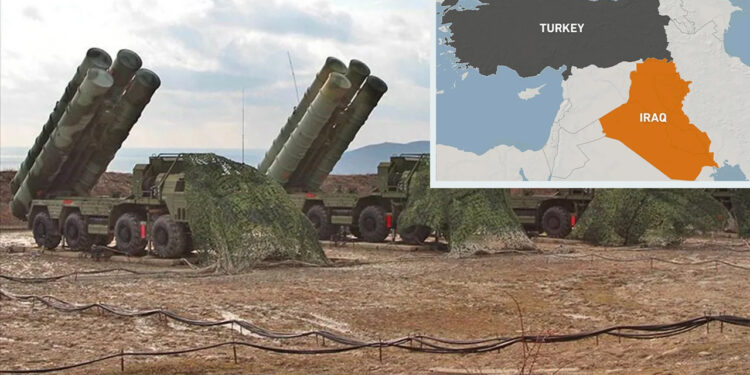According to the Turkish daily Türkiye, Turkey plans to deploy S-400 air defence systems along the Iraq border as a preparation for its upcoming military operation against the Kurdish guerrilla forces in Iraqi Kurdistan.

Turkey plans to deploy S-400 air defence systems along its border with Iraq in preparation for a military offensive against Kurdish guerrilla forces in Iraqi Kurdistan, as reported by the Turkish daily Türkiye.
This move is part of a broader strategy announced by Turkish President Recep Tayyip Erdoğan following a cabinet meeting on 4 March, vowing to permanently end the Kurdish guerrillas by the summer. “Our preparations are ready to disrupt the plans of those who are trying to undermine Turkey by establishing a ‘Terroristan’ on our southern border,” he remarked, employing a derogatory play of words in reference to Kurdistan.
Additionally, the President reiterated Turkey’s longstanding goal of establishing a security corridor extending 30-40 kilometres into Syrian territory, indicating an intention to consolidate the current Turkish occupation of the region.
According to Türkiye, the initiative is expected to accelerate after the Eid al-Fitr holiday and is allegedly a measure to protect the regions against technologically sophisticated attacks from the Kurdistan Workers’ Party (PKK), including drone and kamikaze strikes.
However, the Turkish daily does not clarify the rationale behind the deployment of a state-of-the-art air defence system against a guerrilla group like the PKK, raising questions about proportionality. The S-400 is among the most sophisticated defence systems available and is intended to counter high-level aerial threats, including those from state actors, compared to simpler, commercially available drones or improvised UAVs that are usually employed by guerrilla groups and operate at lower altitudes hard for the S-400s to target accurately.
The deployment of the S-400s is likely more connected to escalating regional tensions, ranging from the unrest in Gaza to the intensifying conflicts in the Caucasus between Azerbaijan and Armenia.
Meanwhile, another pro-government Turkish daily, Akit, has highlighted further details regarding the operation: the eagerness of Turkey-backed Syrian opposition groups to participate in, the intention to reshape power dynamics in Iraqi Kurdistan by removing the PKK’s presence extending toward Sulaymaniyah (Silêmanî), and the possible timing of the commencement of the offensive following President Erdoğan’s visit to Iraq.
Turkey has recently escalated its threats against the Patriotic Union of Kurdistan (PUK) over its relationship with the PKK. Erdoğan had accused the PUK of harbouring militants and contributing to regional instability, while Foreign Minister Hakan Fidan alleged that the PUK, which is the ruling force in Suleymaniyah, has been supporting the PKK by providing them with national identity cards and access to medical facilities and other infrastructure.
Turkey’s cross-border military operations into Iraq and Syria, particularly those targeting civilian infrastructure, have attracted significant criticism both domestically and internationally and have faced accusations of war crimes.
Turkey’s acquisition of S-400 air defence systems from Russia significantly impacted its relations with the United States, leading to Turkey’s removal from the F-35 fighter jet program and casting uncertainty over F-16 sales due to security concerns until the country successfully negotiated support for Sweden’s NATO membership in exchange for greenlighting the sale of F-16 jets. Recently, Jim Jeffrey, a former US ambassador known for his pro-Turkey stance, highlighted the need for a pragmatic approach to resolve the standoff, suggesting that reconciling the S-400 dispute could facilitate progress in defence relations between Turkey and the US.








Leave A Comment